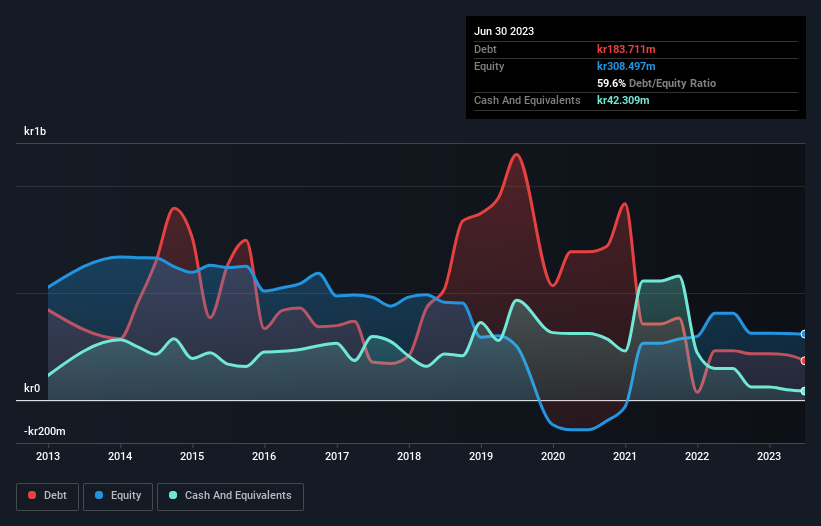Warren Buffett famously said, 'Volatility is far from synonymous with risk.' So it seems the smart money knows that debt - which is usually involved in bankruptcies - is a very important factor, when you assess how risky a company is. We note that Eqva ASA (OB:EQVA) does have debt on its balance sheet. But should shareholders be worried about its use of debt?
When Is Debt A Problem?
Debt assists a business until the business has trouble paying it off, either with new capital or with free cash flow. Ultimately, if the company can't fulfill its legal obligations to repay debt, shareholders could walk away with nothing. While that is not too common, we often do see indebted companies permanently diluting shareholders because lenders force them to raise capital at a distressed price. Having said that, the most common situation is where a company manages its debt reasonably well - and to its own advantage. The first step when considering a company's debt levels is to consider its cash and debt together.
See our latest analysis for Eqva
What Is Eqva's Net Debt?
As you can see below, Eqva had kr183.7m of debt at June 2023, down from kr230.7m a year prior. However, it does have kr42.3m in cash offsetting this, leading to net debt of about kr141.4m.

How Strong Is Eqva's Balance Sheet?
The latest balance sheet data shows that Eqva had liabilities of kr249.2m due within a year, and liabilities of kr166.1m falling due after that. Offsetting these obligations, it had cash of kr42.3m as well as receivables valued at kr198.2m due within 12 months. So it has liabilities totalling kr174.8m more than its cash and near-term receivables, combined.
This deficit is considerable relative to its market capitalization of kr192.8m, so it does suggest shareholders should keep an eye on Eqva's use of debt. This suggests shareholders would be heavily diluted if the company needed to shore up its balance sheet in a hurry. When analysing debt levels, the balance sheet is the obvious place to start. But it is Eqva's earnings that will influence how the balance sheet holds up in the future. So when considering debt, it's definitely worth looking at the earnings trend. Click here for an interactive snapshot.
In the last year Eqva wasn't profitable at an EBIT level, but managed to grow its revenue by 85%, to kr757m. With any luck the company will be able to grow its way to profitability.
Caveat Emptor
While we can certainly appreciate Eqva's revenue growth, its earnings before interest and tax (EBIT) loss is not ideal. Indeed, it lost kr5.7m at the EBIT level. Considering that alongside the liabilities mentioned above does not give us much confidence that company should be using so much debt. Quite frankly we think the balance sheet is far from match-fit, although it could be improved with time. We would feel better if it turned its trailing twelve month loss of kr23m into a profit. So in short it's a really risky stock. There's no doubt that we learn most about debt from the balance sheet. However, not all investment risk resides within the balance sheet - far from it. We've identified 2 warning signs with Eqva , and understanding them should be part of your investment process.
At the end of the day, it's often better to focus on companies that are free from net debt. You can access our special list of such companies (all with a track record of profit growth). It's free.
Valuation is complex, but we're here to simplify it.
Discover if Eqva might be undervalued or overvalued with our detailed analysis, featuring fair value estimates, potential risks, dividends, insider trades, and its financial condition.
Access Free AnalysisHave feedback on this article? Concerned about the content? Get in touch with us directly. Alternatively, email editorial-team (at) simplywallst.com.
This article by Simply Wall St is general in nature. We provide commentary based on historical data and analyst forecasts only using an unbiased methodology and our articles are not intended to be financial advice. It does not constitute a recommendation to buy or sell any stock, and does not take account of your objectives, or your financial situation. We aim to bring you long-term focused analysis driven by fundamental data. Note that our analysis may not factor in the latest price-sensitive company announcements or qualitative material. Simply Wall St has no position in any stocks mentioned.
About OB:EQVA
Eqva
Provides technical solutions and services to maritime and land based industries in Norway and internationally.
Excellent balance sheet second-rate dividend payer.
Market Insights
Community Narratives




